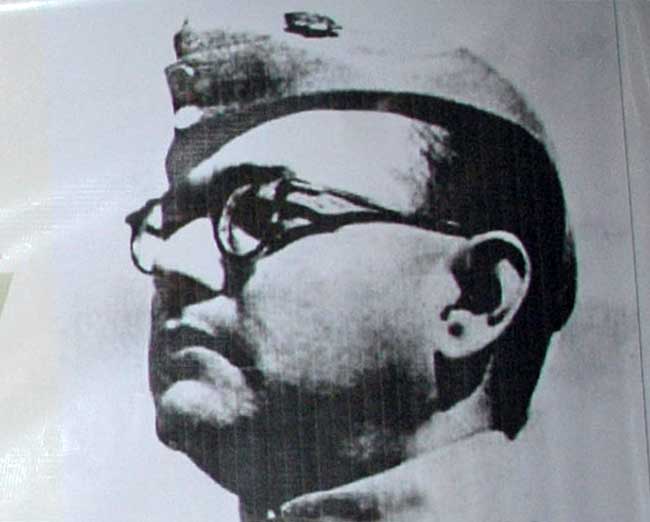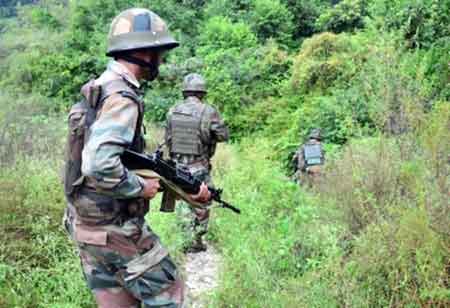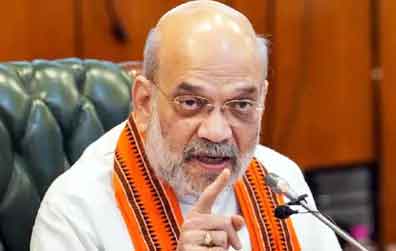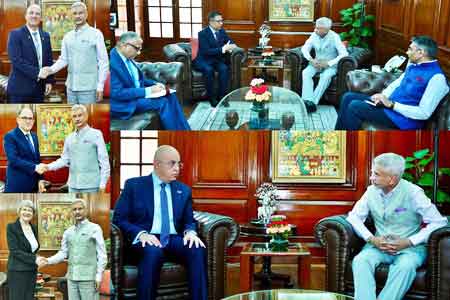The centrality of Netaji Subhas Bose to the Narendra Modi-Bengal narrative is irrevocable. Netaji was pretty much rediscovered by Modi and the installation of his statue at the Central Vista is proof of concept.
Netaji was undeniably kept in history's deep freeze for 75 years by the Congress, his contributions to Congress ideology and history was never acknowledged adequately by various governments, rather he was ignored ignobly.
Netaji was a patriot with a larger-than-life persona, his trajectory after splitting from the Congress was nothing short of sensational. Embedded in the Bengali psyche, he remains peerless for his revolutionary-like status and militant role in our freedom struggle.
But what led to the souring of his relationship with Gandhi and Patel and to a lesser extent with Nehru. Protected by British power, the rulers of princely states neglected their subjects; they not only collected rent but also various illegal levies and subjected people to forced labor while squandering away a major part of their states' revenues for the upkeep of their luxurious lifestyles, denying the masses their democratic rights. This infuriated Jawaharlal Nehru.
In 1927, the All India States' Peoples Conference was born to coordinate the people's movements in various princely states. At first, the Congress hesitated to take up the cause of people's movements on legal and practical grounds, but Nehru was at the vanguard of change.
In the end, the Fabian Socialist triumphed, bringing different instrumentalities to bear against all those who opposed him in his endeavour to create a united and unified India.
To stampede the princes, he used Lord Mountbatten; to corral them he used the combination of Sardar Vallabhbhai Patel and V.P. Menon; to overturn the Dickie Bird Plan for Independence, he used Edwina Mountbatten, who in turn chose to pack V.P. Menon off to Shimla to offer his version instead and got it approved by both Mountbatten and Nehru, who, as luck would have it, were both present in the Queen of the Hills, recouping.
The Haripura Congress session of 1938 is considered seminal for many reasons, not the least for Subhas Chandra Bose's whiplash-inducing speech as the new party president.
At the same session, the Indian States' Peoples Resolution provided the basis for one of the most pivotal debates of the Congress session. About the proposed Federation under the new Constitution, this question was considered to be of utmost importance and occupied the Subjects Committee for five hours in a heated discussion.
Ben Bradley wrote: "The concern of the delegates was not merely actuated by the importance of the Indian states in the Federation, but at the Calcutta session last October of the All-India Congress Committee, a resolution was adopted condemning the repression in Mysore state and supporting the heroic struggle of the people in that state."
This was a crucial time for the Congress itself and Jawaharlal Nehru's stalking horse strategy of using the All India States' People's Conference (AISPC) to make deeper inroads into the autocratic princely states, which required radical democratisation to free the populace from serfdom and penury. The starter pistol had truly gone off and the process of a new India began to be fashioned.
Bradley writes that subsequently doubts were raised as to the validity of this resolution. There was opposition in the All-India Congress Committee to the resolution and certain Congress leaders, including Mahatma Gandhi, stated that the Congress had no right to interfere in the affairs of Indian states, and thought that this resolution constituted an interference.
It was to clear this up that the question was discussed at Haripura. Gandhi believed in the concept of trusteeship and how the princes represented this concept in their states vis-a-vis their attitude toward their subjects. Nehru opposed this and finally, the breakthrough benefit came at Haripura, not just with this resolution, but with new president Bose's vehement support of Nehru's vision of an India where the provinces and the princely states would coalesce.
Bradley goes on to provide a perspective on the actual happenings: "The delegates representing various Congress committees from the Indian states felt and spoke very strongly for the closer relationship between the people struggling in Indian states and those struggling in British India. The Left Wing and the Socialist section of the Congress delegates thought that the mass struggle, to win basic civil liberties and responsible government, was growing in the states.
"Further close cooperation was essential between the states' people and the people of British India to fight the Federation. It was also the duty of the Congress not merely to sympathise with the struggle of the states' people, but to fraternise with them and give active assistance in the fight against the autocracy of the Princes."
The original resolution moved by Abul Kalam Azad sought to relieve the Congress of responsibility in connection with the present struggle of the Indian states' peoples. This was covered by the following point in the resolution:
"The Congress, therefore, directs for the present that no Congress committee be established in Indian states and that internal struggles of the people of the states be not undertaken in the name of the Congress."
Jawaharlal Nehru, batted for the resolution, saying it did not renege on the Congress attitude towards the states' peoples, and added: "But the question that had become vital was that they had to face realities and march independently towards their common goal."
Speeches were made by all sections of the delegates strongly condemning this resolution. From the delegates coming from Indian states, a fervent appeal was made to the Congress not to refuse help to the states' peoples in their hard fight against feudal lords and despotic rulers.
One Congress delegate, Jayanarian Vyas from Ajmer-Merwara, asked the Congress high command: "Would you take away from us what even autocratic rulers or bureaucratic imperialism has not dared to take away, namely, our right to be in the Congress?"
Pattabhi Sitaramayya, in a fighting speech, exposed the dangers of the Congress adopting the policy which must follow from the resolution of isolating Indian states, and was allowed to move an agreed amendment accepted by Abul Kalam Azad. The amendment deleted the clause opposing the formation of Congress committees in Indian states, and instead stated:
"The Congress, therefore, directs that the present Congress committees in states shall function only under the direction and control of the working committee, and shall not engage in direct action in the name or under the auspices of the Congress, nor undertake internal struggles of the peoples of the state in the name of the Congress. For this purpose, independent organisations should be started and continued where they exist already within the states."
Pattabhi suggested that based on this formula, all other amendments should be withdrawn. On this proposition, 11 out of 13 amendments were withdrawn.
The motion on relations between the Congress and Indian states' peoples was then put to vote and carried.
This resolution represented a retrogressive step, particularly at this juncture, when British Imperialism was drawing up its final plans to introduce the Federal side of the new Constitution, under which one-third of the total seats in the Federal government were to be reserved for the despotic Princes, who denied even the basic democratic rights to the states' subjects.
It is at this stage that full support had to be been given to the struggle of the people in the Indian states for democratic rights and civil liberties and to carry this through effectively, ways and means of strengthening Congress organisations in the states had to be planned.
The 70 million people in the Indian states had to be drawn into the Congress as allies of the Indian people in a common struggle for liberation against British imperialism and its allies, the despotic princes.
Nehru's silent opposition to Gandhi's concept of trusteeship found new thrust and kinetic energy as both the AISPC and the Congress went full tilt to emasculate the arrogant princes by enlarging the scope of democratisation.
(The author is the Editor-in-Chief of the Indo-Asian News Service and author of five books, including 'Princestan: How Nehru, Patel and Mountbatten Made India' and the just-released 'Gilded Cage: Years That Made and Unmade Kashmir')








5,409 patients underwent successful surgeries in last three months at AGMC and GBP Hospitals: Health Secretary
A total of 5,409 patients underwent successful surgeries in the last three months at Agartala Government Medical College and GBP Hospital, said state health secretary Kiren Gitte on Sunday.
Two arrested for killing monkeys, monitor lizard
In a shocking incident at Tarani Nagar Malakar Para in Kanchan Bari, Fatikrai (Dhalai District), two youths were arrested for brutally killing four monkeys and a monitor lizard.
Four illegal Bangladeshi held at Agartala Railway Station
In a joint operation, the Agartala Government Railway Police (GRP), Railway Protection Force (RPF), and the Intelligence Department apprehended four Bangladeshi nationals late last night at the Agartala Railway Station for illegal entry into India.
Support our boys to kick out illegal Bangladeshis from Tripura: Pradyot
Tripura royal scion Pradyot Kishore Manikya Debbarma on Sunday asserted that with proper support, local youths are capable of defending their land and preventing illegal Bangladeshi migrants from entering India.
Tripura's unemployment ratio less than national average, claims CM Saha
Tripura Chief Minister Manik Saha said on Sunday that the state's unemployment percentage is less than the national average and the government is trying hard to further improve it.
25 people held or quizzed by police in 3 NE states for 'seditious' comments on Pahalgam terror attack
At least 25 persons were arrested or questioned by the police in three northeastern states - Assam, Tripura and Meghalaya -- for making controversial comments on social media after the Pahalgam terror attack, which left 26 dead, officials said on Sunday.
Four held in Tripura for social media posts relating to Pahalgam terror attack
Police arrested four people including two retired teachers in the past 24 hours from Tripura’s three districts for making controversial posts on social media relating to the Pahalgam terror attack, officials said on Saturday.
Indian Army responds firmly to ceasefire violations by Pakistani troops along LoC
In the wake of the recent terrorist attack in Pahalgam, Pakistan has resorted to unprovoked ceasefire violations along the Line of Control (LoC). Over the past two days, Pakistani military posts have been targeting Indian positions with small-arms fire. The Indian Army has given a strong and appropriate response to these provocations, official sources said.